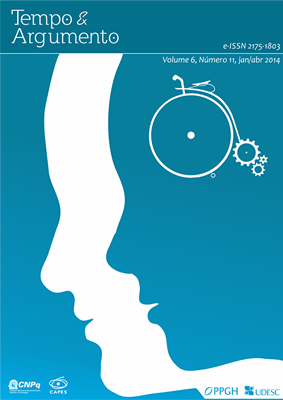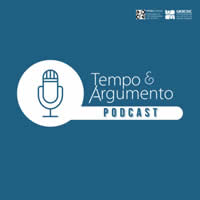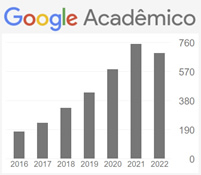Crenças epistêmicas em mudança? Um estudo investigativo do conhecimento entre futuros professores de história
DOI:
https://doi.org/10.5965/2175180306112014069Resumo
Este estudo investiga crenças epistêmicas em mudança na área de história entre 18 futuros professores de história. Colhendo dados desses estudantes de graduação em história que estavam considerando seguir a carreira docente, o estudo procede a uma investigação sobre como as crenças epistêmicas podem mudar neste momento crucial de desenvolvimento. O instrumento de escala Likert serviu como ferramenta para reunir dados primários e foi aplicado em um estágio antes e depois do curso. Dados de observação e de entrevista aumentaram os dados da escala. Um curso sediado em uma universidade serviu como veículo educacional com o objetivo de influenciar as crenças epistêmicas. Os resultados entre os futuros professores foram mistos. Algumas crenças epistêmicas dos alunos não se alteraram, enquanto outras mudaram, e algumas fortemente. As razões para as influências variadas são o tema da discussão. E as implicações dos resultados também serão considerados.
Palavras-chave: Conhecimento epistêmico; Pensamento histórico; Ensino de história; Futuros Professores.Downloads
Referências
BENDIXEN, Lisa. A process model of epistemic belief change. In: HOFER, Barbara. K. and PINTRICH, Paul R. (Eds.). Personal epistemology: The Psychology of beliefs about knowledge and knowing. Mahwah, NJ: Earlbaum, 2002, p. 191-209.
BRITZMAN, Deborah. Practice makes practice. A critical study of learning to teach. New York, NY: SUNY Press, 1991.
BUEHL, Michelle M., & ALEXANDER, Patricia A. Beliefs about academic knowledge. Educational Psychological Review. v. 13, p. 385-418, 2001.
CUBAN, Larry. History of teaching in social studies. In: Shaver, James P. (Ed.). Handbook of research on social studies teaching and learning. New York, NY: Macmilian, 1991, p. 197-209.
DAVIDSON, James. & LYTLE, Mark Hamilton. After the fact: The art of historical detection. New York, NY: McGraw Hill, 1992.
DAVIS, Natalie Zemon. On the lame. American Historical Review. v. 93, p. 572-603, 1988.
FINLAY, Robert. The refashioning of Martin Guerre. American Historical Review. v. 93, p. 553-571, 1988.
HOFER, Barbara. Personal epistemology research: Implications for learning and teaching. Journal of Educational Psychology Review. v. 13, n.4, p. 353-383, 2001.
HOFER, Barbara. (2002). Personal epistemology as a psychological and educational construct: An introduction. In: HOFER, Barbara. & PINTRICH, Paul (Eds.). Personal epistemology: The psychology of beliefs about knowledge and knowing. Mahwah, NJ: Erlbaum, 2002, p. 3-15.
HOFER, Barbara; PINTRICH, Paul. The development of epistemological theories: Beliefs about knowledge and knowing and their relation to learning. Review of Educational Research. v. 67. n.1, p. 88-140, 1997.
HICKS, David, DOOLITTLE, Peter, & LEE, John. Social studies teachers’ use of classroom-based and web-based historical primary sources. Theory and Research in Social Education. v. 32, n. 2, p. 213-247, 2004.
KENNEDY, Mary (2005). Inside teaching: How classroom life undermines reform. Cambridge: Harvard University Press, 2005.
KING, Patricia, & KITCHENER, Karen Strohm. The reflective judgment model: Twenty years of research on epistemic cognition. In: HOFER, Barbara & PINTRICH, Paul R. (Eds.). Personal epistemology: The psychology of beliefs about knowledge and knowing. Mahwah, NJ: Erlbaum, 2002, p. 37-61.
KLOPPENBERG, James. Objectivity and historicism: A century of American historical writing. American Historical Review. v. 94, p. 1011-1030, 1989.
KUHN, Deanna, & WEINSTOCK, Michael (2002). What is epistemological thinking and why does it matter? In: HOFER, Barbara K. & PINTRICH, Paul R. (Eds.). Personal epistemology: The psychology of beliefs about knowledge and knowing. Mahwah, NJ: Erlbaum, 2002, p. 121-145.
LAMPERT, Magdalene (1990). When the problem is not the question and the solution is not the answer: Mathematical knowing and teaching. American Educational Research Journal. v. 27, p. 29-63, 1990.
LEE, Peter. Understanding History. In: SEIXAS, Peter (Ed.). Theorizing historical consciousness. Toronto: University of Toronto Press, 2004, p. 129-164.
LEE, Peter, & ASHBY, Rosalyn (2000). Progression in historical understanding among students ages 7-14. In: STERNS, Peter; SEIXAS, Peter & WINEBURG, Samuel (Eds.). Knowing, teaching, and learning history: National and international perspectives. New York: NYU Press, 2000, p. 192-222.
LEE, Peter, & SHEMILT, Denis. A scaffold, not a cage: Progression and progression models in history. Teaching History. v. 113, p. 13-24, 2003.
LORTIE, Dan. Schoolteacher. Chicago, IL: University of Chicago Press, 1975.
MAGGIONI, L., ALEXANDER, P., & VANSLEDRIGHT, B. At a crossroads? The development of epistemological beliefs and historical thinking. European Journal of School Psychology. v. 2, n. 1-2, p. 169-197, 2004.
MAGGIONI, Liliana, VANSLEDRIGHT, Bruce, & ALEXANDER, Patricia. Walking on the borders: A measure of epistemic cognition in history. The Journal of Experimental Education. v. 77, n. 3, p. 187-213, p. 2009.
MAGGIONI, Liliana; VANSLEDRIGHT, Bruce; & REDDY, Kim. Epistemic talk in history. In: biennial conference of the European Association for Research on Learning and Instruction (EARLI). Amsterdam, Netherlands, 2009.
MCDIARMID, Williamson; & VINTEN-JOHANSON, Peter (2000). A catwalk across the great divide: Redesigning the history teaching methods course. In STERNS, Peter; SEIXAS, Peter, & WINEBURG, Samuel (Eds.). Knowing, teaching, and learning history: National and international perspectives. New York: New York University Press, 2000, p. 156-177.
MEGILL, Allan. Historical knowledge, historical error: A contemporary guide to practice. Chicago: University of Chicago Press, 2007.
MUIS, Krista R.; BENDIXEN, Lisa D.; & HAERLE, Florian. Domain-generality and domain-specificity in personal epistemology research: Philosophical and empirical reflections in the development of a theoretical framework. Educational Psychology Review. v. 18, p. 3-54, 2006.
NOVICK, Peter. That noble dream: The objectivity question and the American historical profession. Cambridge, UK: Cambridge University Press, 1988.
PAXTON, Robert J. A deafening silence: History textbooks and students who read them. Review of Educational Research. v. 69, p. 315-339, 1999.
SCHOENFIELD, Allan. Beyond the purely cognitive: Belief systems, social cognitions, and metacognitions as driving forces in intellectual performance. Cognitive Science. v. 7, p. 329-363, 1983.
SCOTT, Joan W. After history? Common Knowledge. v. 5, p. 9-26, 1996.
STRØMSØ, Helge I., & BRÅTEN, Ivair (2002). Norwegian law students’ use of multiple sources while reading expository texts. Reading Research Quarterly. v.37, p. 208-227, 2002.
VANSLEDRIGHT, Bruce. What does it mean to think historically and how do you teach it? In: PARKER, Walter (Ed.). Social studies today: Research and practice. New York, NY: Routledge, 2010, p. 113-120.
VANSLEDRIGHT, Bruce (2011). The challenge of rethinking history education: On practices, theory, and policy. New York, NY: Routledge, 2011.
VANSLEDRIGHT, Bruce & FRANKES, Lisa. Concept and strategic knowledge development in historical study: A comparative exploration in two fourth grade classrooms. Cognition and Instruction. v. 18, n. 2, p. 239-283, 2000.
WINEBURG, Samuel. Historical thinking and other unnatural acts: Charting the future of teaching the past. Philadelphia, PA: Temple University Press, 2001.





